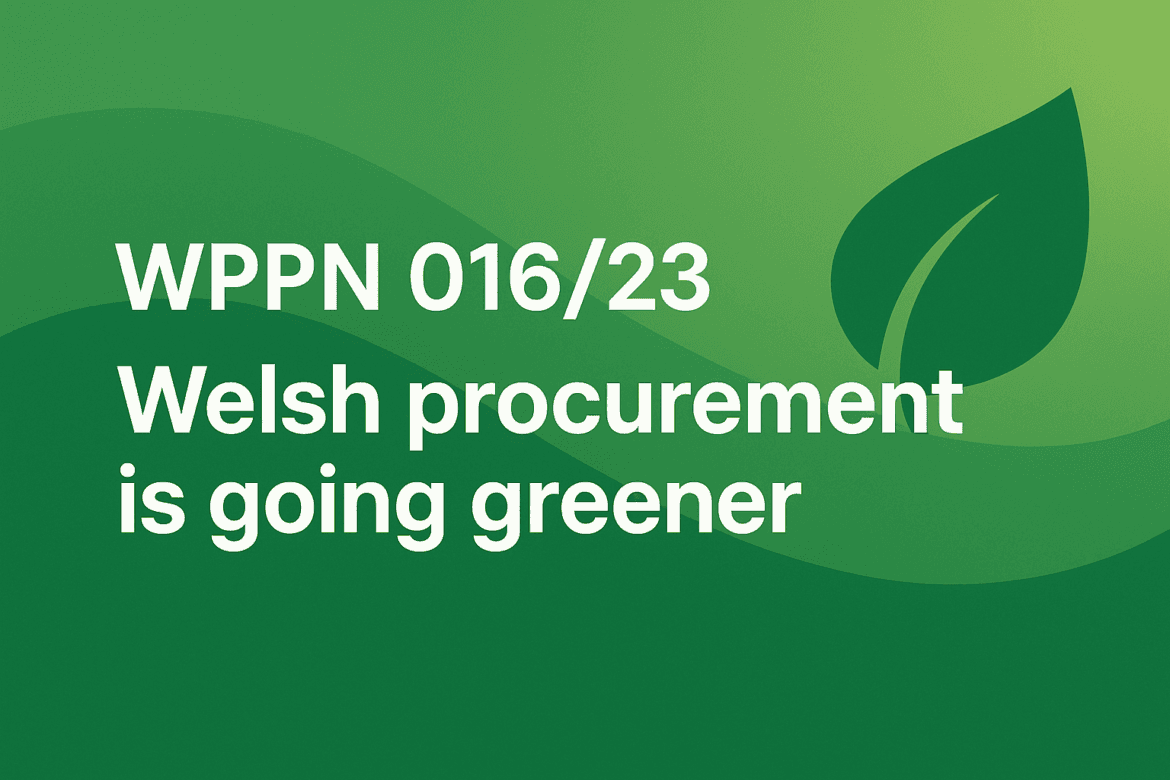What the Welsh Procurement WPPN 006 Means for SMEs
- Carbon reduction plans
- Apr 29, 2025
Sustainability is no longer just a “nice-to-have” for small businesses. In Wales, new public sector rules are raising expectations and creating real opportunities for SMEs that are ready to act.
If your business supplies goods or services to the public sector, you need to understand WPPN 006 (formerly 016/23). This new guidance could have a direct impact on your ability to win future contracts and stay competitive.
What is WPPN 006?
WPPN 006 is the Welsh Government’s latest Procurement Policy Note, published in February 2025 but based on Procurement (Wales) Regulations 2024. It provides guidance on how public sector buyers should consider carbon emissions when awarding contracts and it strengthens and replaces WPPN 06/21.
A major focus is on Scope 3 emissions, which are the indirect emissions that come from the supply chain. This means that suppliers, including SMEs, must now show how they are working to reduce their carbon footprint.
In practical terms, if you want to win or retain public sector work in Wales, you will need to demonstrate real action on decarbonisation.
Why WPPN 006 Matters for SMEs
Until recently, much of the net zero conversation centred on large companies. WPPN 006 makes it clear that SMEs are now directly involved in Wales’ wider decarbonisation goals.
Public sector buyers will increasingly ask suppliers for Carbon Reduction Plans and evidence of emissions management. Even if you are a small business, these requirements could determine whether you secure future contracts.
This change also reflects a growing trend across the private sector, where larger businesses are demanding sustainability credentials from their suppliers.
If SMEs can adapt quickly, there is a real chance to stand out from the competition.
How Does Wales Compare to England and the Rest of the UK?
Wales is moving faster and setting stricter expectations than other parts of the UK when it comes to carbon reporting in procurement.
In England, similar requirements exist for major government suppliers through PPN 06/21, but it mainly applies to larger contracts (over £5 million). In contrast, WPPN 016/23 encourages all public sector buyers in Wales to consider carbon impacts across a wider range of contracts, affecting SMEs much more directly.
Scotland and Northern Ireland are also advancing sustainability in procurement, but Wales’ focus on embedding decarbonisation at every level of the supply chain makes it a standout leader
What Evidence Will SMEs Be Expected to Provide?
Under WPPN 006, Welsh public sector buyers are increasingly looking for clear, credible evidence from their suppliers. This could include:
✅ Carbon Reduction Plans (CRPs) — Carbon Reduction Plans are clear, structured documents showing your current carbon footprint (including Scope 1, 2, and where feasible Scope 3 emissions) along with measurable plans to reduce it.
✅ Evidence of Emission Reduction Actions — Practical proof that you are taking steps to cut emissions. For example:
- Switching to renewable energy
- Electrifying your vehicle fleet
- Greening your supply chain
- Providing carbon training for staff
✅ Annual Carbon Emissions Reporting — Regularly updating your emissions data and sharing progress, aligned with recognised standards like PAS 2060.
✅ Net Zero Commitments — Having a formal, public commitment to achieving net zero by 2050 or sooner.
✅ Third-party Accreditation or Self-certification — Either having external validation of your carbon data (e.g., ISO 14064 certification) or robust self-reporting with transparent methodologies.
✅ Project-specific Climate Measures — For certain types of contracts (such as construction or major services), demonstrating how your specific project activities will reduce carbon emissions.
Examples in practice:
- Transport for Wales expects suppliers to align with its Sustainable Development Plan, often requiring detailed Carbon Reduction Plans even for medium-sized contracts.
- Welsh NHS Shared Services Partnership integrates carbon assessment into its tender scoring system, making climate credentials a factor in contract awards.
- Local councils such as Cardiff and Swansea are already weighting “social value,” including carbon action, when assessing bids.
For SMEs, even smaller tenders may now include scored questions on climate impact. Having a basic but credible Carbon Reduction Plan puts you ahead of many businesses who are unprepared.
The Challenges SMEs Face
Meeting the requirements of WPPN 006 can feel overwhelming, especially for small businesses that lack specialist knowledge, time, or budget.
Common challenges include:
- Not knowing where to start with a Carbon Reduction Plan
- Worrying that carbon reporting is too complex or costly
- Feeling that net zero targets are only achievable for big companies
The good news is that practical, affordable support is available.
How Gopher Zero Can Help
Gopher Zero is designed to make decarbonisation simple and accessible for SMEs.
The platform allows small businesses to:
- Build compliant Carbon Reduction Plans quickly and at low cost
- Understand the business case for net zero rather than simply ticking a compliance box
SMEs can sign up directly, and pay £199 for a basic CRP published in as little as 30 minutes, or be enrolled for free through a supply chain cluster to make collective reporting easier and more efficient for bigger corporate buyers. Coming soon, Gopher Zero will launch a climate resilience hub, helping SMEs and their clients to prepare for future climate risks and continue thriving no matter what changes come.
By using Gopher Zero, SMEs can meet the expectations set by WPPN 006, strengthen their market position, and contribute to a sustainable future.
Conclusion
WPPN 006 signals a major shift in how public contracts will be awarded in Wales. SMEs that act now will not just stay compliant, they will unlock new business opportunities and build stronger, more resilient companies.
To find out how simple it can be to get started, visit Gopher Zero and see how your business can turn net zero action into a competitive advantage.
